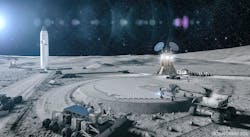Astroport Space Technologies awarded a NASA Technology Research contract for lunar construction
SAN ANTONIO - Astroport Space Technologies, Inc. was awarded a NASA Phase 1 Small Business Technology Transfer contract (STTR) for development of its lunar regolith melting technology for constructing landing pads on the Moon.
Astroport and its research institution partner, The University of Texas at San Antonio (UTSA) will jointly develop technology for an "Induction Furnace-Nozzle for Forming and Placing Lunar Regolith Bricks for Landing Pad Construction". NASA selected 289 small businesses and 47 research institutions to receive Phase I funding for its 2021 SBIR/STTR program. Astroport was one of only four Texas companies selected for this year's STTR program.
Astroport Space Technologies, Inc. is a deep tech space start-up with headquarters in San Antonio, Texas. The company was founded in 2020 as a subsidiary of Exploration Architecture Corporation (XArc), also based in San Antonio. Founder and CEO, Sam Ximenes, a San Antonio native and Space Architect said,
"With NASA's return to the Moon with outposts and base camps, and commercial ventures for mining and even space tourism we see a market for space civil engineering construction developing within the next decade. With this initial small contract we hope to plant the seeds for a San Antonio industry to become known for expertise in space construction processes and manufacturing. We believe San Antonio's heavy construction industry should start positioning now for access to this future market."
Astroport's Lunar Regolith Melting and Lunar Regolith Binding stabilization and solidification technologies are used for manufacturing feedstock for lunar construction. Astroport's technology addresses two challenges of space construction: (a) converting indigenous source material (regolith) into durable construction feedstock and (b) robotic emplacement and assembly of the same into surface structures such as landing pads, roads, and habitats. The project research will be conducted at Astroport's R&D laboratories at Tech Port San Antonio and laboratories at UTSA.
